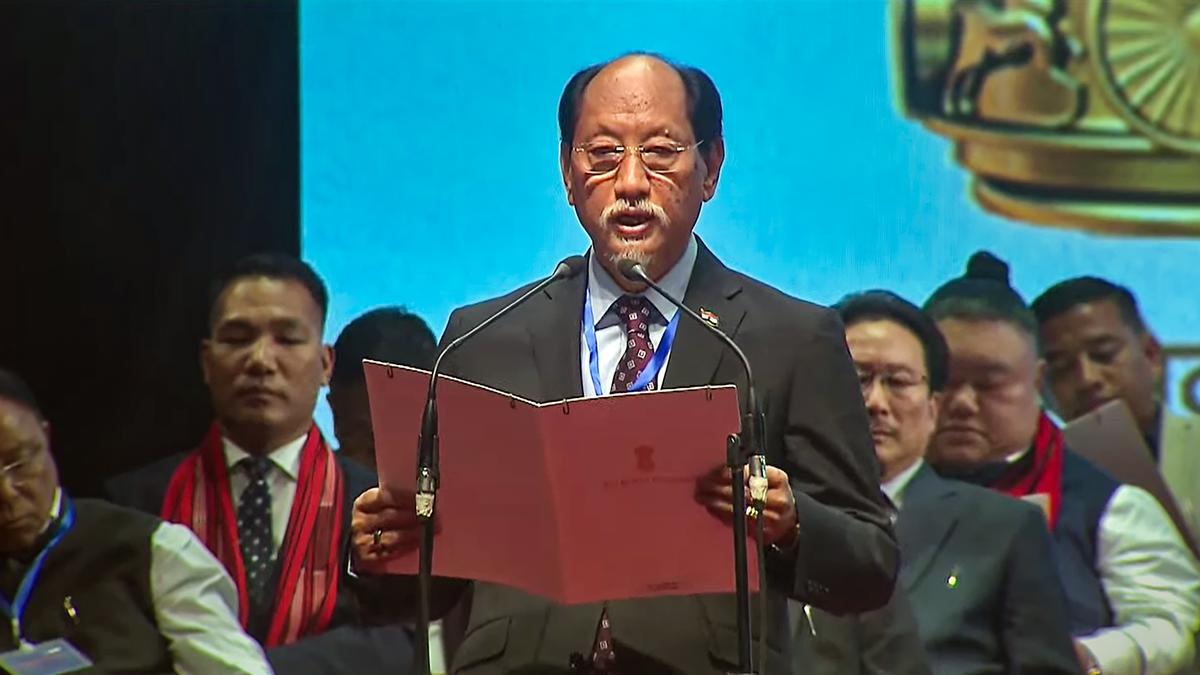CM Neiphiu Rio remarked that any significant administrative reforms, including those related to reservations or delimitation, should be undertaken only after the national Census exercise scheduled for 2027. File.
| Photo Credit: PTI
The story so far: On April 26, an organisation of five “advanced” tribes in Nagaland set the Neiphiu Rio-led government a 30-day deadline to revise the job reservation policy for the State’s Backward Tribes (BTs). The government formed a panel on September 22 to examine the job quota policy, but the five-tribe body found fault with its nomenclature.
What is the job reservation policy?
Almost four years after it attained statehood in December 1963, Nagaland introduced a policy to reserve 80% of State government jobs for all indigenous Scheduled Tribes. The government identified 11 BTs in 1977 and apportioned for them what came to be known as “reservation within a reservation”. In August 2024, Chief Minister Neiphiu Rio told the 60-member Nagaland Assembly that 37% of non-technical and non-gazetted jobs are currently reserved for BTs. He said this quota is divided into 25% for seven BTs in eastern Nagaland comprising six districts — Kiphire, Longleng, Mon, Noklak, Shamator, and Tuensang — and 12% for the remaining four BTs. An April 2011 notification from the State’s Personnel and Administrative Reforms Department said the Chakhesang and Pochury tribes inhabiting Phek district will be clubbed together for half the 12%, while the Zeliang tribe will have 4% of government jobs reserved for them, and the remaining 2% will be reserved for the Sumi tribe in Kiphire district. Beyond Kiphire, the Sumis are among the five non-BT communities along with the Angamis, Aos, Lothas, and Rengmas.
Why do the tribes want this policy revised?
In September 2024, the Five Tribes Committee on Review of Reservation Policy (CoRRP) submitted a memorandum to the State government, requesting an assessment of the job quota system. The members of this committee are representatives of the apex social bodies of each of these five tribes. The committee argued that the policy was relevant in 1977, but it no longer reflects the prevailing socio-economic and educational landscape of the State. Its secretary, G.K. Zhimomi, said that the CoRRP’s core demand was to “either scrap the reservation policy altogether or allocate the remaining unreserved (20%) quota to the five tribes.” He also said the government went back on a move to review the policy in 1987 and issued an order two years later, stating that the quota slabs would continue until further notice. The CoRRP set its first 30-day deadline on April 26 for the government to act on its demand for a review. “We are not against any tribe benefiting from the reservation policy. A review of this 48-year-old policy is long overdue because of the vastly different scenario now,” they said.
How did the government respond?
Reacting to the CoRRP’s demand, student and social organisations of the BTs listed as beneficiaries of the job quota opposed any potential revision, arguing that the dilution of the current policy would disproportionately harm the State’s marginalised communities. Wary of a backlash from these tribes, the government chose to tread carefully. The CoRRP launched its initial phase of agitation after the expiry of its 30-day ultimatum. It was suspended after Deputy Chief Minister Yanthungo Patton assured them that a commission to review the policy would be constituted by June 17. However, Mr. Rio remarked that any significant administrative reforms, including those related to reservations or delimitation, should be undertaken only after the national Census exercise scheduled for 2027. On August 6, the State Cabinet approved the constitution of a seven-member Job Reservation Commission to be headed by a retired IAS officer of the Nagaland cadre. The following day, government spokesperson and Minister K.G. Kenye cited official data to claim that the five non-BT tribes hold 64% of the government jobs while the BT tribes hold 34%. He indicated that the status quo needed to be maintained.
Why does the stalemate continue?
The CoRRP criticised the first commission announced in August as it accommodated a member each from the Eastern Nagaland People’s Organisation, the Central Nagaland Tribes Council, and the Tenyimi Union Nagaland. They insisted that this commission lacked neutrality as these three organisations represented the BTs wholly or partially. The CoRRP also found fault with the second commission the government announced on September 22. They said that the government deviated from an agreement to name this panel ‘Job Reservation Commission’ instead of ‘Reservation Review Commission’, thus implying it was not serious about reviewing the existing quota system. The difference over the panel’s nomenclature is yet to be resolved.
Published – October 05, 2025 02:45 am IST

